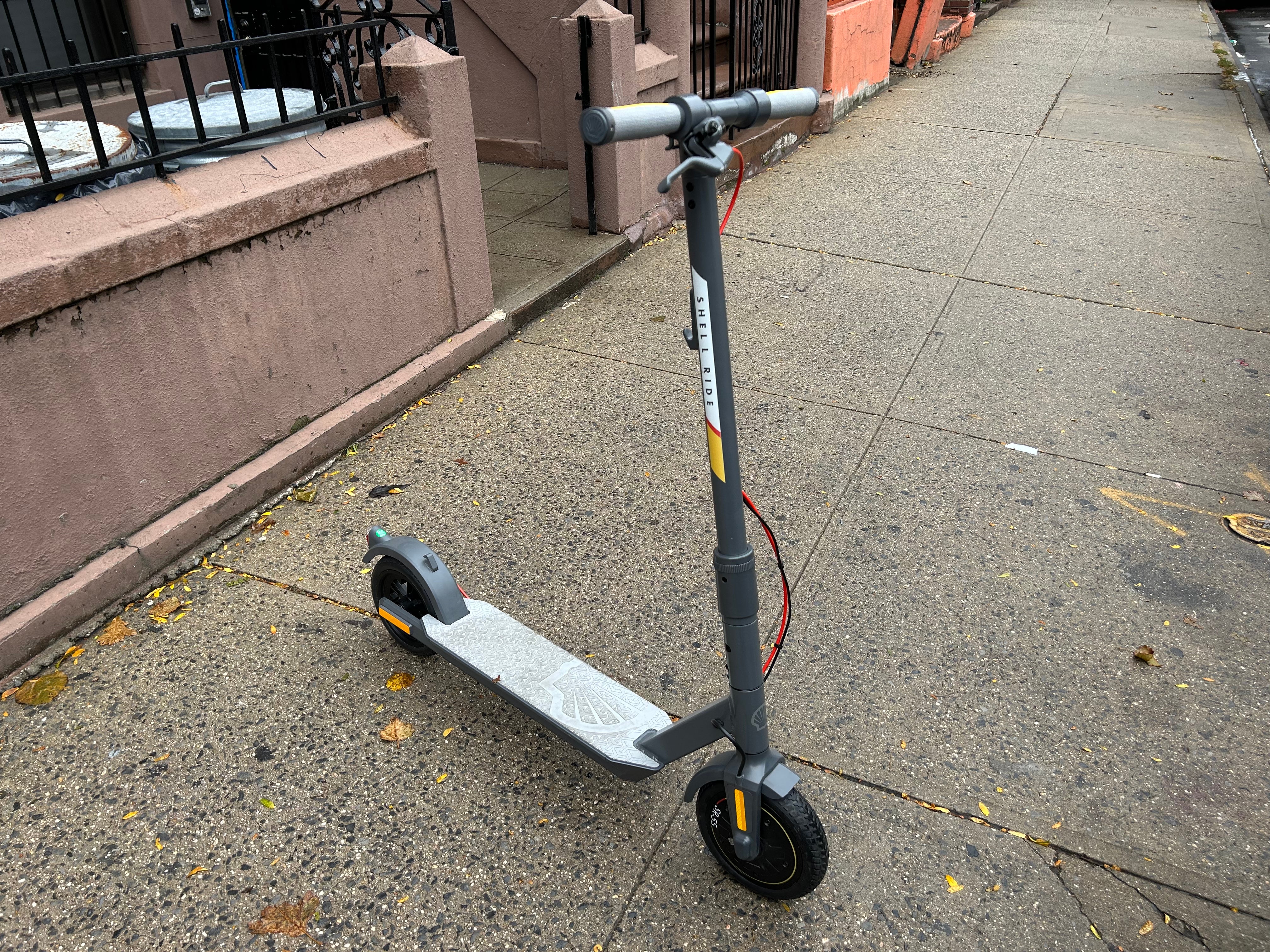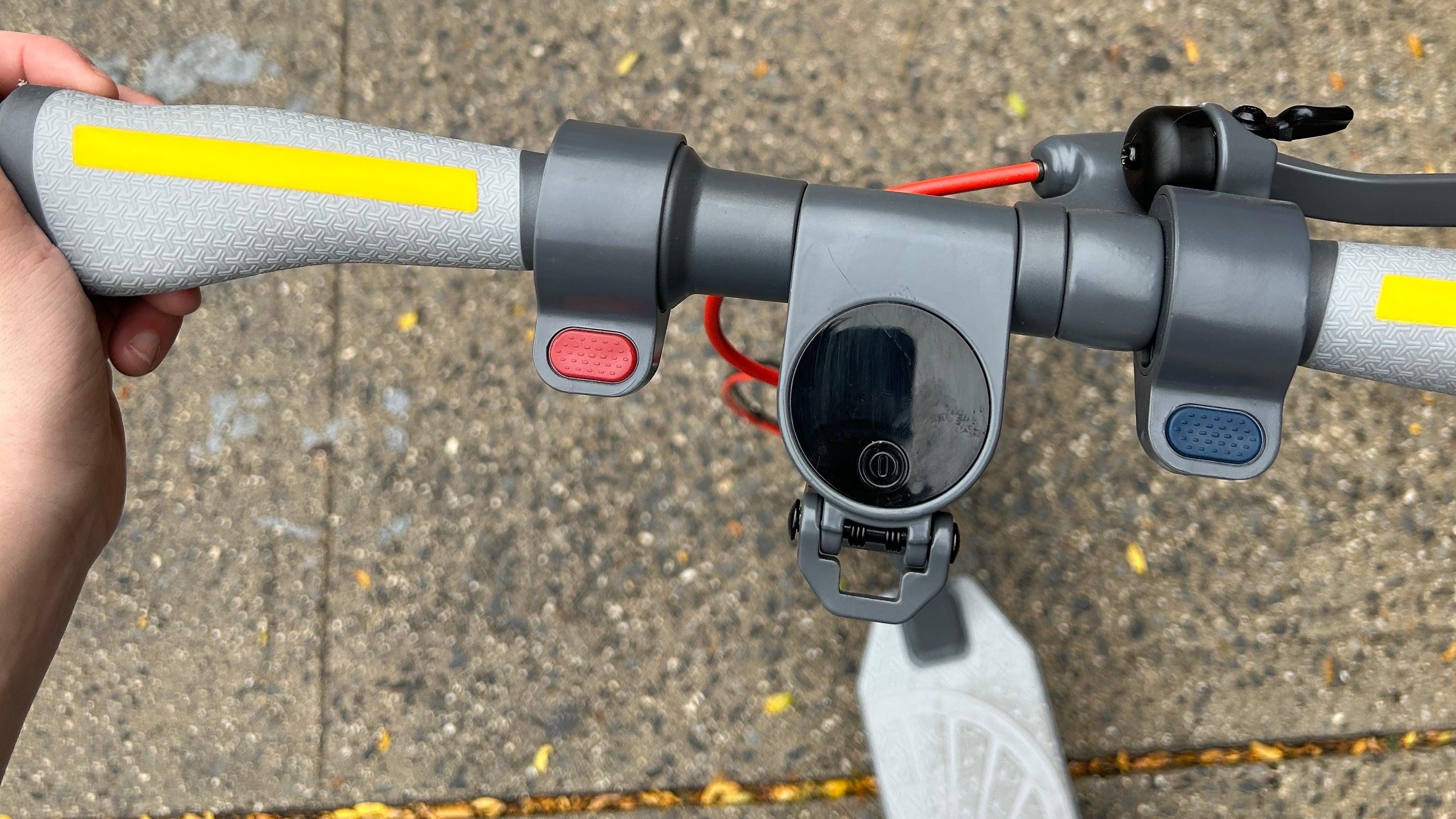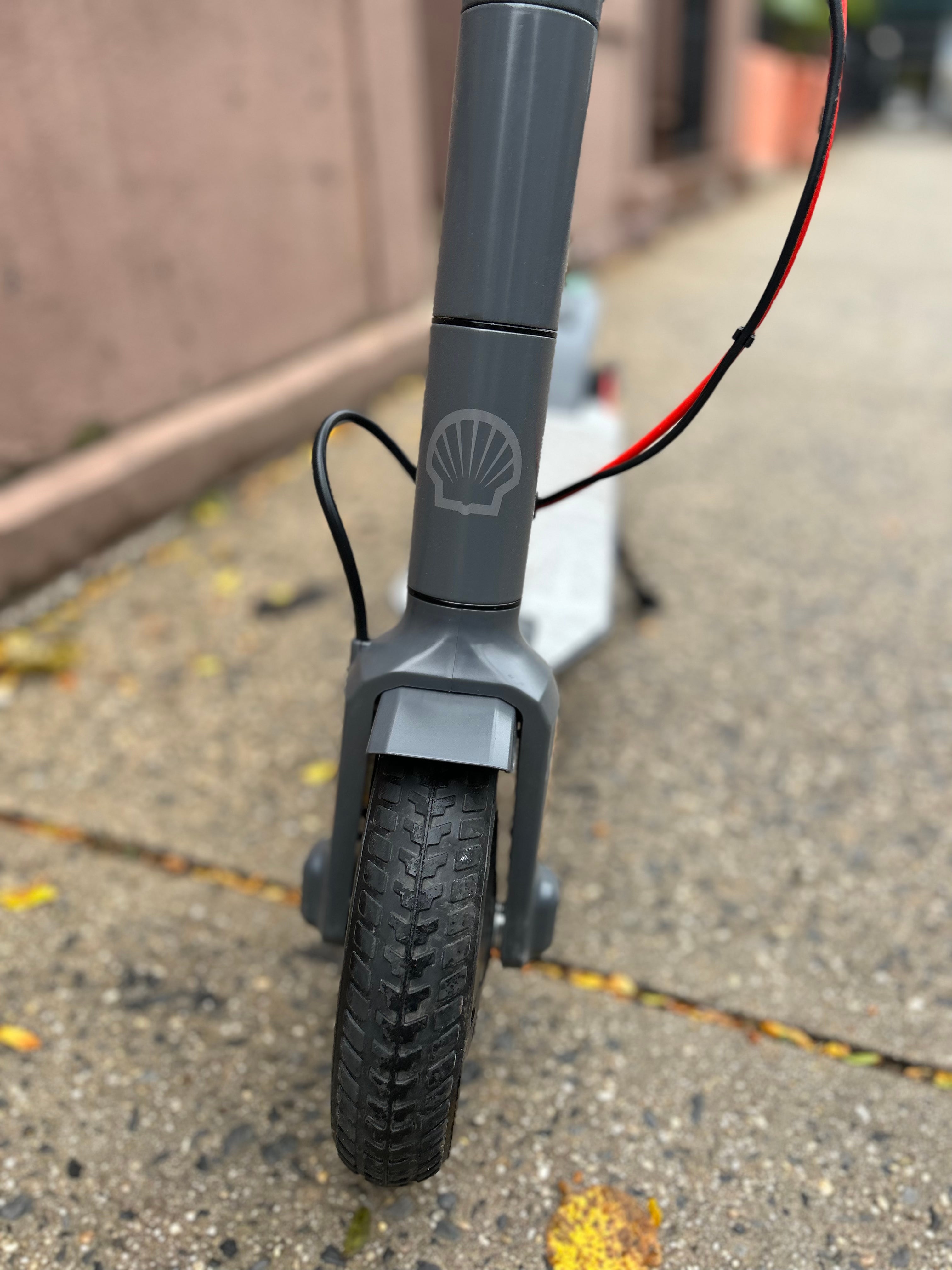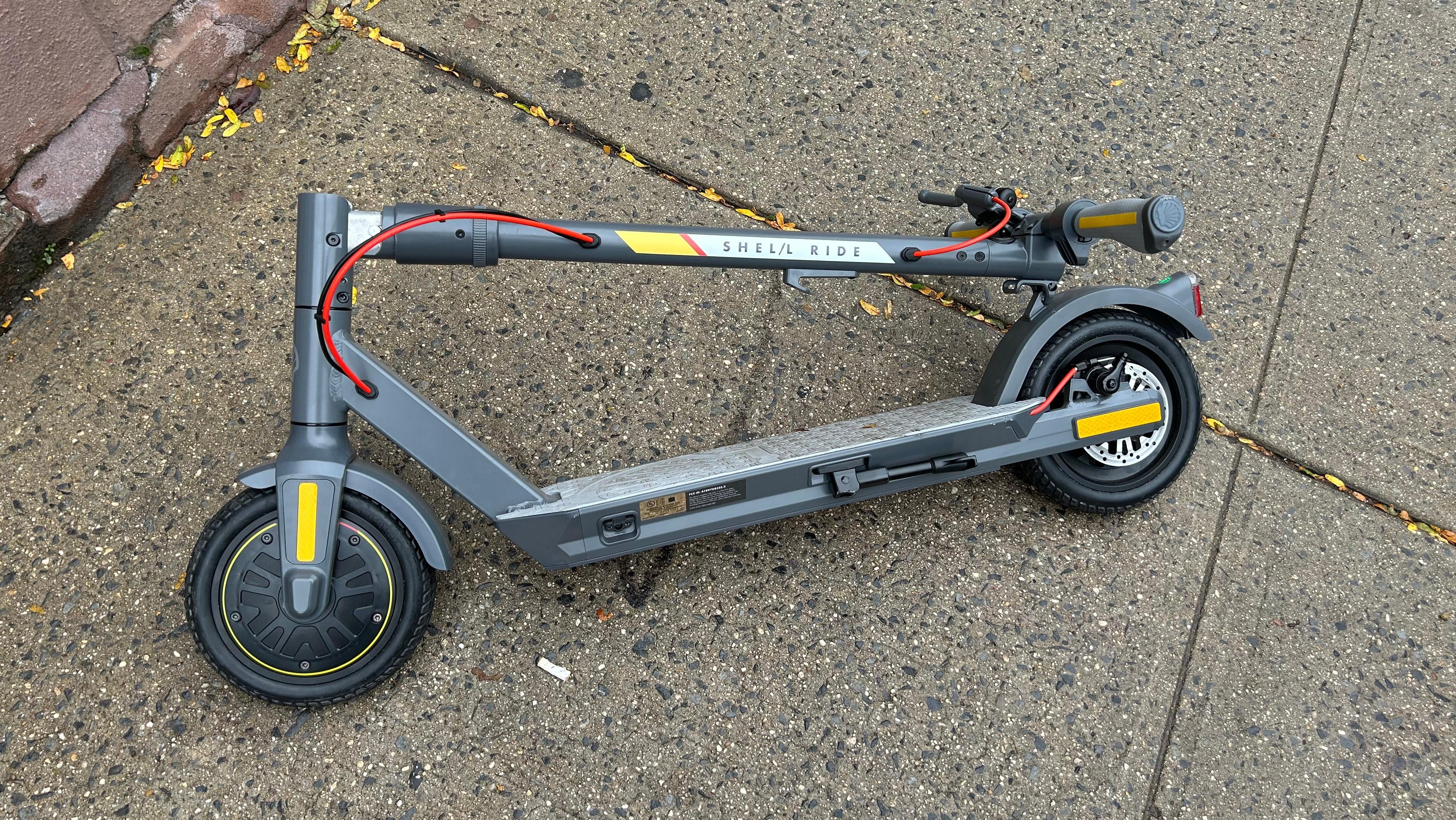Finish this joke: A climate reporter rides a scooter branded with the logo of a major international oil company for a weekend. What could possibly go wrong?
That was the question I set out to answer when a representative for Shell’s consumer products reached out to Gizmodo to ask if we wanted to test out the company’s electric scooter model. Despite all the very mean things I’ve written about Shell in the past, the company sent me its first electric scooter model, the SR-5S, which launched last year.
I was curious as to what the experience would be like. Would I be able to ignore the Shell logos and text scattered around the body of the scooter? Had Shell designed a product so miraculous that it would change the fact that the company is one of the world’s most prolific polluters?
The answer to both those questions is no, and my experience with the Shell Ride scooter further illustrated some of the extreme ironies of green capitalism. Also: I crashed it. Oops!
Why Is Shell Doing This?

The scooter business isn’t operated by Shell itself but by a company called Lotus International, which is a licensee of Shell’s consumer products arm. Lotus, in turn, doesn’t actually handle production of the scooters, just the sales and marketing. In addition to the SR-5S model, per the website, Shell and Lotus have plans to roll out two other electric scooter models and three e-bikes.
But why the hell is Shell, specifically, doing this? Great question. The licensee arrangement, like what Lotus has with Shell, appears to be purely for companies to be able to put Shell logos on various categories of consumer products. An info page for potential licensees on Shell’s site describes the types of stuff the company is hoping to see its logo on, including car care, apparel, toys — and a section labelled “power,” which includes batteries, power generators, and “new energy products.”
“Utilise the brand’s power and technology equities and join Shell on its transition to cleaner, sustainable energy brand,” the website’s copy reads.
The “About” page on the Shell Ride site gives a little more insight into the scooters. “The world’s energy system is changing,” the copy reads. “…Shell is exploring e-scooters and e-bikes as part of our commitment to delivering more and cleaner energy. Shell’s ambition is to be a net-zero emissions company by 2050, or sooner, in step with society. To achieve this, we will need to implement a mosaic of solutions to help lower our carbon emissions and those of our customers who use our products.”
In other words, these scooters and other licensed products are PR tools to help cultivate the image that Shell is working for the energy transition. Meanwhile, the company is continuing to ramp up production of fossil fuels, in direct contradiction to what science says we need to do. Super! I’m sure a couple schmucks like me riding around in a Shell-branded scooter will totally offset all that oil the company is drilling, and I wouldn’t be surprised if the SR-5S makes it into the company’s 2022 Sustainability Report next year as some sort of example of how Shell is working to revolutionise carbon-free transport.
With that in mind…
What’s the Scooter Actually Like?

An enormous caveat before this review begins: I’m really not a scooter guy. I’ve got a normal bike I use pretty happily to commute during good weather, and the subway or walking do just fine otherwise. The only electric scooter I’ve ridden was one Lime rental back pre-pandemic; before that, the last time I was on a scooter was on my trusty purple Razor when I was, like, 12.
The SR-5S came packaged in a ridiculously heavy box that arrived at my office. After lugging it to my desk, setup at first proved very easy — only one part of the scooter, the top handle, needed any sort of assembly. I plugged it in, let the battery charge, and then tried to boot up the scooter — nothing. One very prompt and polite email from the Shell Ride support team (shout out to them) later, I realised I hadn’t done the other very simple part of setup: attaching a cable inside the handlebar. (I work at a tech website, but that doesn’t mean I’m good at technology.) After that minor fix, the SR-5S was ready to roll.
I’m not sure why I decided that the smartest first test of an electric scooter when I’d never ridden one before would be scooting through 12 blocks of Midtown Manhattan — including Times Square, of all places — on a Friday afternoon during New York Comic Con. Suffice to say, I almost died several times while weaving around cars, clueless tourists, and pedicabs choking the bike lane. I also nearly crashed into three different Spider-Men (one working Times Square, the other two presumably headed to Comic Con).
Still, even in the chaos, the scooter was surprisingly easy to figure out: Push down the button throttle on the right handlebar to go forward, ease up to slow down, use either the manual brake on the right handle or the button brake on the left to stop. I felt wobbly as hell, but that might have just been the learning curve of where to place my feet on the Shell-logo-branded footpad, plus my unusually high centre of gravity as a 1.83 m-tall person.
After running my errand, I determined it wasn’t worth it to unfold the SR-5S (the locking mechanism to fold the scooter is pretty fiddly and took a while to get used to) and scoot the crowded block and a half to Penn Station to hop the subway home, so I decided to carry the scooter. The SR-5S is a pretty light in terms of what else is on the market right now, at just 14 kg. It’s not exactly a walk in the park to schlep it a couple blocks and through the subway, but I managed.
I woke up on Saturday morning and decided to take the scooter to my climbing gym, which is about a 20-minute bike ride from my home. I wondered if I could figure out how to boot up the Shell Ride companion app, which the scooter’s manual had instructed me to download and which, apparently, has a function to allow the scooter to lock remotely so I wouldn’t have to lug it inside. Plus, if I was going to have a huge oil company logo on my phone’s home screen, I figured I should put it to good use.
Unfortunately, I couldn’t get the app to work; the scooter simply would not connect to my phone’s Bluetooth to get inputs from the app, despite two pairs of wireless headphones finding my phone no problem. (“Bluetooth no connected,” the app kept mournfully telling me in an alert, a phrase that made me laugh for basically the entire weekend.) I’m positive the nice customer service people would also have been able to help me with this issue. But at this point, it was the weekend, and I was heartily embarrassed by how much help I’d already needed setting up a simple scooter, and you don’t actually need the app to scoot around.

The ride to the gym is on mostly well-maintained streets in Brooklyn, with functioning, uncluttered bike lanes — a way better testing environment than Times Square — and it definitely took less time to e-scoot up there as it usually does to bike. The scooter rode pretty smoothly, slowing down a fair bit on the uphill but not so much that it was annoying; I kept it on the lowest speed settings but still was routinely hitting 14 to 15 mph. The sun was out, it was a gorgeous day, and I felt very cool and mobile — until, that is, I stopped at the entrance of the gym and was sure I saw a dude do a double-take at the Shell logo on my scooter.
I kept scooting around that weekend, taking the SR-5S out for a few more errands and to meet some friends. Beyond my general lack of enthusiasm about e-scooters as a choice of transportation, I had some minor complaints with the actual product after a few days of use. The plastic of the scooter’s body was already starting to show signs of wear, especially around the latch where I kept clicking the handle. The lock mechanism to fold the scooter was still a little fussy, and it’s a big thing to lug inside a crowded cafe or bar. The light grey colour, while keeping with Shell’s colour scheme, also meant that grime on the foot pad and scratches on the body showed easily; the Shell Ride logo had somehow gotten a scratch already in the few days I was using it. Still, the scooter got me from Point A to Point B on these short rides, and the battery charge held up fine.
But it never stopped being strange riding around on something that advertised so blatantly for an oil company. I decided to get some outside input, so on Monday evening, after visiting the gym, I scooted a quick five minutes north to visit a friend at the bar where she worked and meet up with some other friends. I was curious about how people who weren’t me reacted to the Shell branding — maybe I was overblowing how obvious it was.
I was not. People laughed at me when I brought the scooter indoors. “It seems a little redundant,” one of the bartenders told me. “Fuck Shell, fuck Big Oil,” another said. Sure, we’re in ultra-lefty Brooklyn, but the sentiment was pretty clear: the branding of this scooter is, to put it bluntly, hella weird.

It was dark by the time I left, so I turned on the front and rear lights on the SR-5S, preparing for a meditative scoot home. Maybe the branding wouldn’t matter so much to other customers. Maybe I was being too cynical and should allow room for a company like Shell to change its stripes. Maybe —
All of a sudden, I was flying arse-over-elbows, the wheels of the SR-5S jamming as it crashed. In my inexperience with electric scooters, I’d misjudged a small, deep pothole: one that would have caused an unpleasant bump on my larger bike wheels but caught the scooter’s smaller wheel completely. The SR-5S locked automatically, and I was unable to turn it back on. My scooting adventure ended like it had begun that first day in Midtown: Me hauling 14 kg of oil-company-branded scoot by hand several blocks to get home.
The SR-5S’s 8.5-inch wheels are pneumatic, meaning that I didn’t get a flat tire — which is great — but two days later and after a full charge, the scooter still doesn’t turn on. Looks like another email to tech support might be in order. (Sorry, y’all.)
What’s the Point?
To be as fair as possible, I browsed the specs of some of the other scooters on the market to get a sense of what special features Shell may have brought to the table with the model I tested. Retailing for $US549 ($762), the SR-5S is on the cheaper end of the range of electric scooters — but it’s not unbeatable. As far as I can tell, there are several similar scooters on the market — for around the same price point, with lots of the same features — that don’t act as mobile billboards for an oil company. Revolutionary, this scooter is not.

The whole experience also got me thinking about how green capitalism is being set up to help “solve” the climate crisis. One of the ironies here is that some preliminary research shows that e-scooters actually have a pretty high set of life cycle emissions, higher than basically every other form of transportation except passenger cars; what’s more, there’s some evidence that scooters may actually add CO2 emissions in some cities, as they replace some trips people may otherwise walk or bike. (That was certainly the case with me: All the trips I used the scooter for would have been either biking, walking, or taking public transit.)
If a company like Shell really wanted to revolutionise climate-friendly transportation, the most useful thing it could actually do (besides, you know, stop producing fossil fuels) would be to invest lobbying power and funds into an overhaul of public transportation. Obviously, that’s a whole lot harder than slapping your logo on a product you can market as green and sell to a cohort of city yuppies to pitch them on how your company is changing its stripes.
So am I an e-scooter convert? I’ve got a fat bruise on my shin, so I’ll probably be sticking with my bike from now on. But if you’re in the market for an e-scooter, the SR-5S is a totally fine choice — as long as you’re ok with doing free greenwashing for one of the world’s biggest climate criminals.
